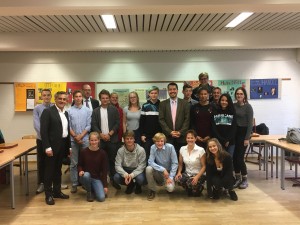How to Make American-German relations Great Again
 Ever since Donald Trump’s election for President of the United States of America, Germans have been wondering why he was elected and what policies could be expected of him. On Friday, September 8, the Q2 WiPo profile had the chance to ask a representative of the U.S. directly – Richard Yoneoka, the Consul General to Northern Germany.
Ever since Donald Trump’s election for President of the United States of America, Germans have been wondering why he was elected and what policies could be expected of him. On Friday, September 8, the Q2 WiPo profile had the chance to ask a representative of the U.S. directly – Richard Yoneoka, the Consul General to Northern Germany.
A Consul General explains the affairs of his specific region to Washington and informs the inhabitants of his area about American policies, Mr. Richard Yoneoka explained when students asked this question. He countered with a question of his own: “Who did you expect to come in here with your teacher?” he asked. While students did answer they had expected someone old and possibly slightly overweight, no one appeared surprised to note that the U.S. representative to Northern Germany has Japanese forefathers and German roots. The debate quickly turned to racism, on this and the other side of the Atlantic, and Mr. Yoneoka used his own example to describe how deeply rooted prejudices against non-whites still are in some American states.
Regarding the gap between the rich and the poor as well as the healthcare system, he explained in a very lively way – dividing the class into one half that did pay taxes and could afford being insured and the other half that couldn’t – that in America most taxpayers disagreed with paying for the healthcare of people who did not work and had no money. In general, he said, there was more stress on the individual’s responsibility for his / her life than on the community’s to help people in need.
Students furthermore asked about Donald Trump’s continued raging against illegal immigrants and his call to construct a “big beautiful wall” on the U.S.-Mexican border (that, as we learned, is the same distance as Hamburg-Jerusalem). But how many are aware that it is Obama who received the nickname “Deporter-in-Chief” (derived from the U.S. president’s title Commander-in-Chief) for deporting so many illegal immigrants back to Mexico that the immigration rates were actually negative? And that it is in fact the legally immigrated Mexicans who are most ardently against illegal immigration?
The current crisis regarding North Korea was another topic students were interested in. Mr. Yoneoka questioned the assumption that this was mainly a power struggle between the United States and North Korea, drawing attention to China and Russia’s interests in the region and pointing out that since the Korean War has never legally ended (there is only a ceasefire, but not a peace treaty) it was America’s responsibility to protect its allies, South Korea and Japan. Using the Iran Accord as an example, he said it would be helpful if other states – for example Germany – offered diplomatic assistance.
[Note: On September 10, Chancellor Merkel offered just that.]
Mr. Yoneoka finished the discussion by saying that no matter how big the current differences in opinion were, it was of the utmost importance to keep talking to each other – which is why he came to visit us in the first place.
All in all, it was fascinating to hear from Consul General Yoneoka firsthand and we thank him very much for giving us the opportunity to hear a representative of the United States answer our questions. We’d also like to thank our Mayor, Mr. Saxe, for inviting Mr. Yoneoka to Lübeck in the first place and then joining our discussion round. We hope that this friendly, informative discussion may serve as an example of how to make the relations between our two countries great again.
Svenja Benkert, Eb














